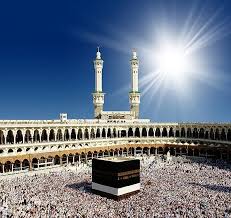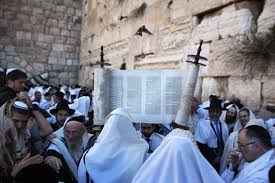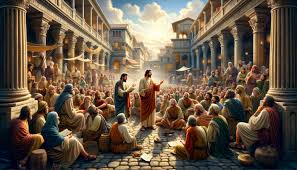Slavery in religion. Religion has been a means to both justify as well as condemn the institution of slavery. Still, almost 1400 years later, there are arguments to be heard on both sides. In each religion there's definitely different things to be taken away from the different sacred texts. In fact, all of these different excerpts can be viewed as evidence backing the other side of the debate depending on how you choose to interpret the excerpt.
Let's start with Islam. In this religion their holy prophet is a man named Muhammad. Muhammad is seen as the chosen recipient and messenger of the word of GOD through divine revelations. Based off this, you can see that Muhammad is a highly respected figure in this religion. Well, In various sections of the Quran, Islam's holy book, we are privy to the fact that Muhammad himself owned slaves. “Muhammad began to take slaves after he moved to Medina, and had power. Slaves were usually taken in raids on nearby Arab tribes, or war, either through offensive or defensive actions." Ibn Qayyim al-Jawziyya, a great scholar and Islamic historian says in his book "Zad al-Ma'ad", part 1, p160: "Muhammad had many male and female slaves. He used to buy and sell them, but he purchased more slaves then he sold. He once sold one black slave for two. His purchases of slaves were more than he sold."

"Muhammad had a number of black slaves. One of them was named 'Mahran'. Muhammad forced him to do more labor than the average man. Whenever Muhammad went on a trip and he, or his people, got tired of carrying their stuff, he made Mahran carry it. Mahran said "Even if I were already carrying the load of 6 or 7 donkeys while we were on a journey, anyone who felt weak would throw his clothes or his shield or his sword on me so I would carry that, a heavy load". Tabari and Jawziyya both record this, so Islam accepts this as true."These quotes makes it seem as though Muhammad was an avid slave owner. Also, not just the fact that he was a slave owner but also the fact that he forced his slaves to do more work than “the average man”. This kind of behavior being exhibited through what the religion sees as their prophet who was chosen by God makes it almost seem as if this exhibited behavior is ok and is also ordained by God. Besides these excerpts, there is also much much more information exhibiting pro slavery behavior in Islam's so called Holy Book.Slaves are as helpless before their masters as idols are before God - Sura 16:77. According to Islam, a Muslim could not be put to death for murdering a slave. Ref. 2:178 and the Jalalayn confirm this. According to this, murdering a slave is almost the equivalent of murdering an animal seeing as there is no punishment nor does it even seem to be looked down upon.
Next up, we have Judaism. In this religion there are various prophets and the final say goes to GOD or Adonai. The holy books of Judaism include portions of the Old Testament of the Bible as well as the Torah, along with a couple others. A Hebrew could not become a slave unless by order of the court or by giving himself voluntarily into bondage. Other slaves were always recruited from outside the nation. It has been opined that the epithet "'eved 'ivri," and the laws relating to Hebrew slaves (Ex. 21:2–6) would apply also to such non-Jewish slaves as were born into the household as the offspring of alien slaves."Of the nations that are round about you, of them shall ye buy bondmen and bondwomen. Moreover of the children of the strangers that do sojourn among you, of them may ye buy and of their families that are with you which they have begotten in your land; and they may be your possession" (Lev. 25:44–45). A debtor who is
unable to pay his debts may give himself in bondage to his creditor (cf.

Lev. 25:39; Prov. 22:7; see also II Kings 4:1; Isa. 50:1; Amos 2:6, 8:6; Neh. 5:5). We see a common theme where slaves are permissible if acquired by way of certain means. These means include debt, prisoners of war, as well as other means of acquiring slaves from outside of the nation. What caught my attention however, was the attention placed on women specifically in certain passages. A father may sell his daughter into slavery (Ex. 21:7), usually apparently for household duties and eventual marriage (Ex. 21:7–11).This almost likens women to possessions that can be handed down by way of men.Female slaves sold into bondage by their fathers go free if their master's sons deny them their matrimonial rights (Ex. 21:11).This specific example implies that female slaves were justified in their situation of slavery unless they weren’t to be married.This specific example implies that female slaves were justified in their situation of slavery unless they weren’t to be married.
In regards to the Christian faith, there is no side taken for or against slavery as like other religions, there is an impartiality on the topic of slavery. However, the Bible has been used to justify slavery with multiple direct verses being cited. Stories told by Jesus that involve slavery and slave masters have been used in the past due to Jesus also taking an impartiality on slavery. Reasoning states that since Jesus never outspokenly says he condemns slavery, he then justifies slavery by keeping silent. A direct verse is Leviticus 25:44-46, which discusses buying slaves and seeing them as property. This verse is one of the main reasons for why slavery is seen as justified by the Bible with no words of potential condemnation in the story being told. A final story used is the one of Noah cursing Canaan after Canaan murdered his brother, Abel. In Genesis 9: 18-29, Noah says to Canaan, “May Canaan be the slave of Shem… May Canaan be the slave of Japeth!” With the word slave being strongly used by Noah, there is a serious justification of slavery involving that story. As told, there are several stories from the Old Testament that justify slavery, but the New Testament is known as having a “changed”
view on slavery even if it never takes a side on the matter. Stories that entail condemning slavery in the Bible are very slim, however, there are letters from St. Paul in which he discusses slavery. He writes to enslaved Christians to push for freedom and to escape from their lives of terror. One final Bible verse found regarding slavery in a more positive manner is

1 Timothy 6:2. This verse discusses how slave masters must treat their slaves in an equally respectful manner and must be devoted to the welfare of the slaves. While this verse does accept slavery and spreads no word of condemnation, showing respect and care for others is the backbone of Christianity and those qualities are ones that not many slave masters display. Therefore, Christianity took its own approach against slavery by calling slave masters to live more as a Christian, even if they were still allowed to own slaves and have them work.








